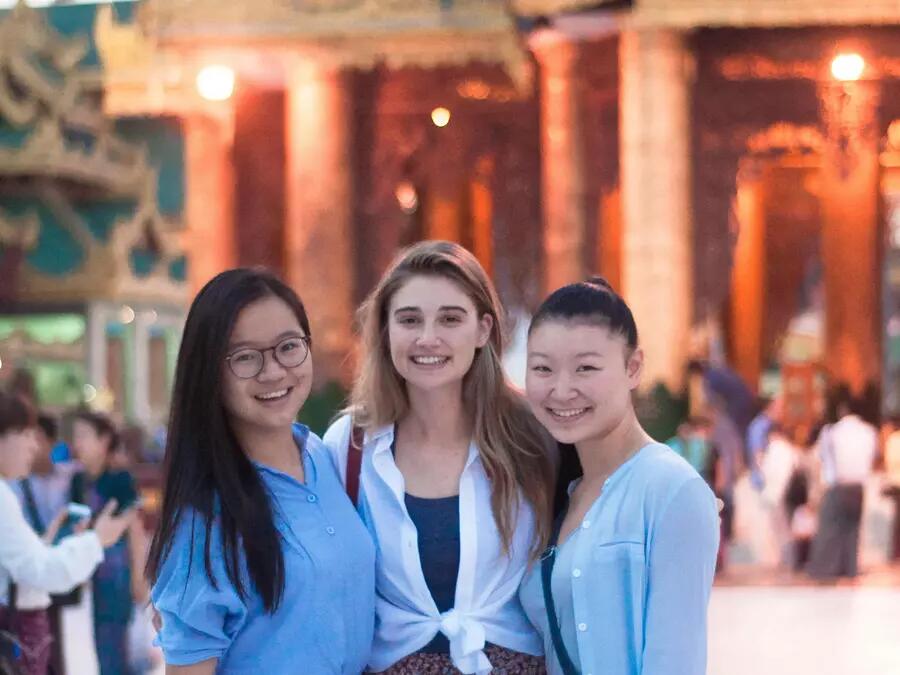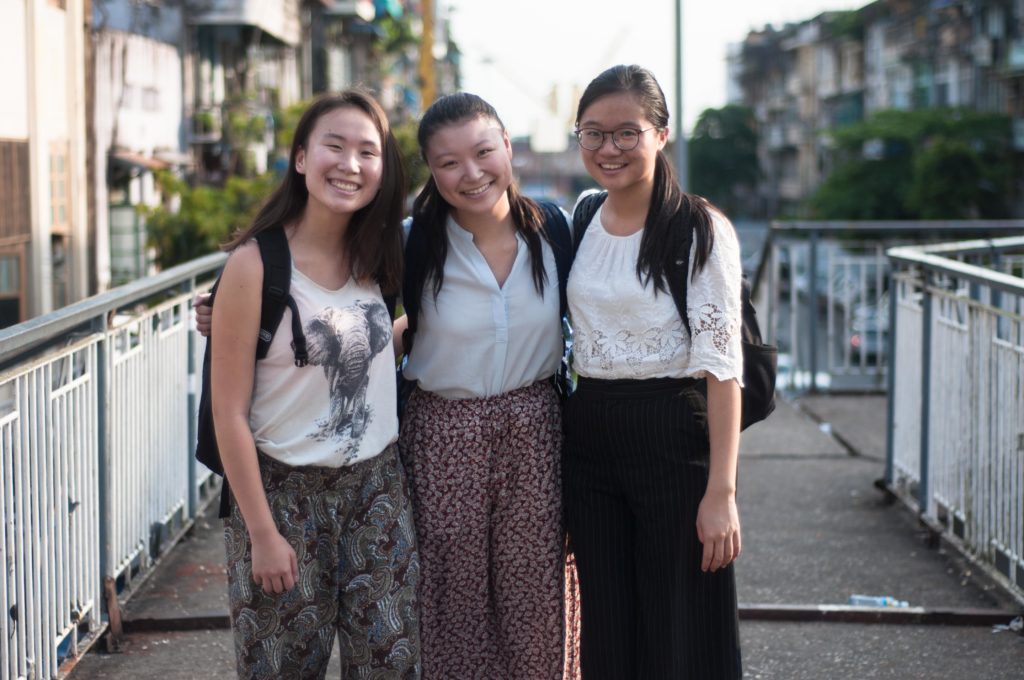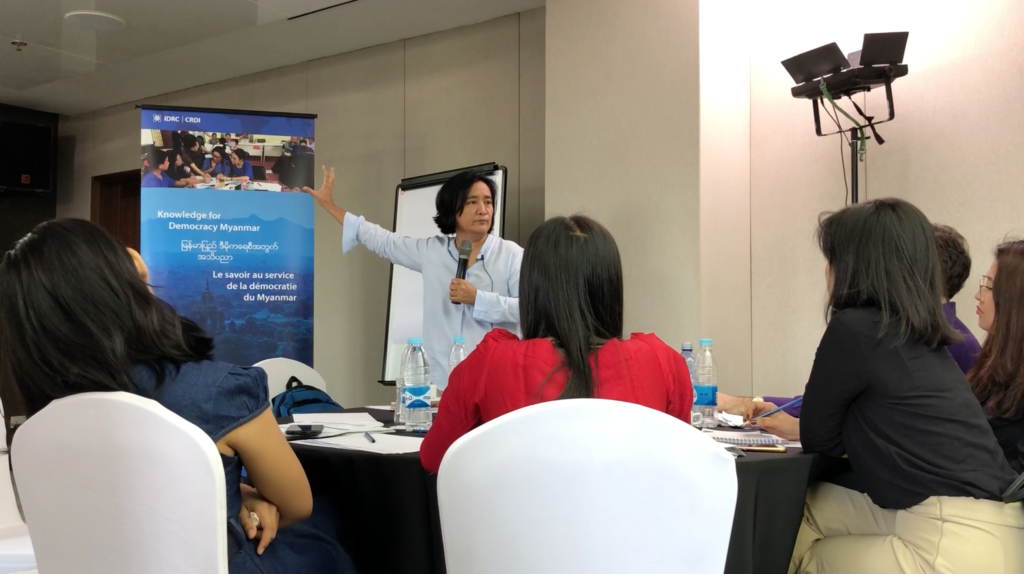
"Nothing Short of Eye-Opening": The Asian Institute's ICM to Myanmar
The Asian Institute’s 2018 International/Indigenous Course Module (ICM) to Yangon, Myanmar offered students a life-changing firsthand experiential learning experience. With support from the Faculty of Arts and Science’s ICM Program, and additional support from the Richard Charles Lee Directorship of the Asian Institute, students and faculty traveled to Yangon for ten days to see, feel, taste, and hear about the issues they had previously studied in seminars and readings.
While in Yangon, students in the Asian Institute’s senior capstone seminar (CAS400: Interdisciplinary Research in Methods in Contemporary Asian Studies) engaged with Myanmarese gender activists, religious leaders, local students, government officials, and business owners to understand the ways that people are adapting to their country’s newly democratic political regime. In the words of CAS400 student and ICM participant Angela Hou, “From negotiating taxi prices in the absence of a meter system to participating in a two-day conference on the theme of gender-sensitive public service delivery, our trip to Myanmar was nothing short of eye-opening.”
This year’s ICM offered the additional unique experience of direct exposure to a major IDRC (International Development Research Centre) project on gender and decentralization in Myanmar. The IDRC project, helmed by Professor Jacques Bertrand (Director of the Collaborative Master’s Specialization in Contemporary East and Southeast Asian Studies and Professor in the Department of Political Science) and Min Zaw Oo (Executive Director of the Myanmar Institute for Peace and Security), offered students an intimate understanding of the interface between Canada’s international development efforts and local actors’ engagements with these new entrants in their rapidly changing country.
The IDRC project examines decentralization’s influence on democratization and federalism in ethnic minority states and regions where years of civil war have stymied the delivery of public services to local populations. Through the project’s workshop, ICM students learned about the lived challenges and opportunities of state actors in the delivery of public services in Myanmar, especially how gender is a key dimension of these processes. Led by Professor Rachel Silvey (Professor of Geography and Richard Charles Lee Director of the Asian Institute) and mentored by graduate fellow Alexandre Paquin-Pelletier, students engaged in extensive workshops with the Myanmar Institute for Peace and Security, as well as many energizing discussions with NGOs, embassy officials, and activists.
As Mariah Stewart explains, “the most impactful component of the trip was our direct exposure to thriving grassroots organizations and activists. I was and continue to be incredibly fascinated by the potential for grassroots movements to effect change in communities but had never experienced this firsthand.” For Mariah the ICM was “by far one of the most amazing opportunities I have had during my undergraduate career.”
Read more about Angela and Mariah’s experiences in Yangon:
This past November, a group of students in the Contemporary Asian Studies program embarked on an International Course Module excursion to Myanmar. As a lucky member of this cohort, I am humbled by the opportunity to critically reflect upon my own positionality in the global system and engage in a different type of learning. During our insightful week-long journey in Yangon, our group was fortunate to meet with a range of stakeholders, from former Canadian diplomats to local NGO representatives. By listening to grassroots organizations who are at the forefront of community-based political participation, we witnessed local manifestations of Myanmar’s complex ethnic, social, and political landscape through the lens of experiential learners. From negotiating taxi prices in the absence of a meter system to participating in a two-day conference on the theme of gender-sensitive public service delivery, our trip to Myanmar was nothing short of eye-opening. Being immersed in the physical site of Myanmar allowed me to access many nuanced lessons and experiences unavailable in conventional textbooks, and to develop human connections and memories that we brought back to Canada. Furthermore, this ICM was especially informative of my academic and professional interests in global governance and international development, as a graduating undergraduate student who wishes to pursue further education in this field of study. I am sure I speak on behalf of all my ICM peers when I say that we are extremely grateful to Professor Rachel Silvey, Professor Jacques Bertrand, Dr. Alexandre Paquin-Pelletier, and the Asian Institute for making this incredible opportunity possible.
—Angela Hou
Travelling to Myanmar with Professor Bertrand, Professor Silvey, and a talented ICM cohort was by far one of the most amazing opportunities I have had during my undergraduate career. The trip centered around meeting with Myanmarese researchers and activists while exploring Yangon. Because Myanmar is so incredibly culturally diverse, there were a million food options and dozens of temples, churches, and even a synagogue in the city!
Further, the ICM group and I also helped facilitate a workshop led by Professor Bertrand and the International Development Research Centre (IDRC) to investigate methods by which to incorporate issues of gender into health, education, and security reform. This was an opportunity for us to gain insights from Myanmarese researchers about fieldwork they have been conducting on the ground for years. We learned a great deal about their primary experiences.
For me, the most impactful component of the trip was our direct exposure to thriving grassroots organizations and activists. I was and continue to be incredibly fascinated by the potential for grassroots movements to effect change in communities but had never experienced this firsthand. One of the organizations we met with was a feminist NGO called Rainfall. A main component of Rainfall’s message is to “learn” feminism instead of teaching it. Rainfall’s form of feminist advocacy allows communities to express and learn what feminism means for them as opposed to having this imposed. Rainfall publishes Myanmar’s only feminist magazine and is an incredible testament to the power of local activism in communities.
—Mariah Stewart



